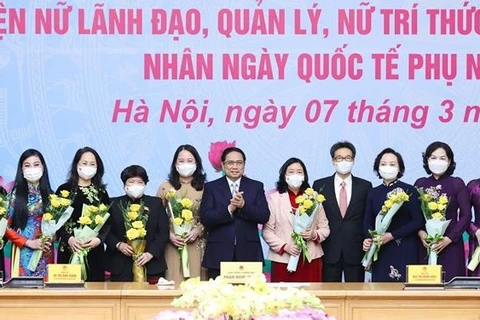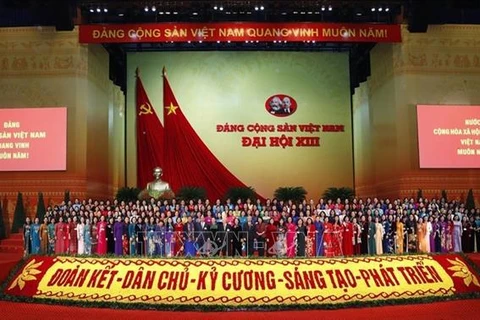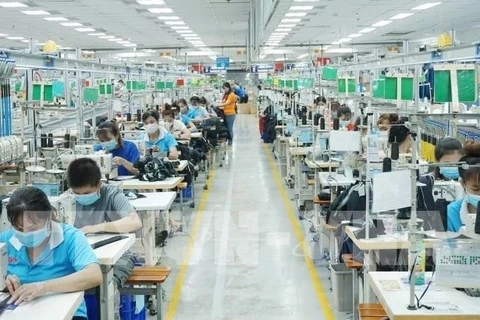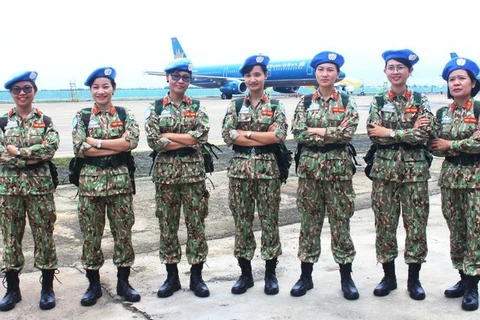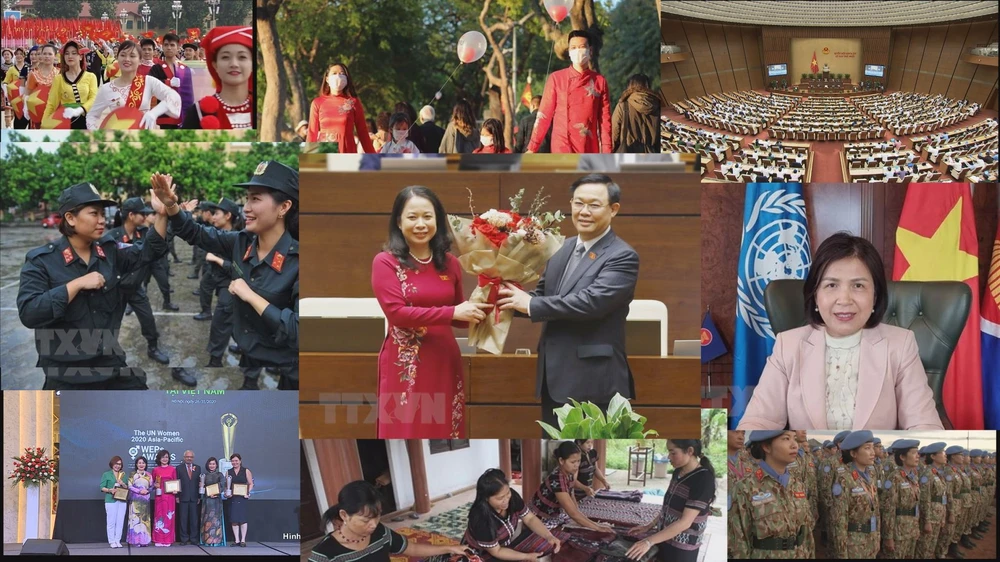
Hanoi (VNA) - The International Women’s Day 2022 “Gender equality today for a sustainable tomorrow” is marked globally today, recognizing women’s contributions to the socio-economic, cultural and political development around the world. The day also marks a call for action for accelerating women’s equality.
Thanks to its tireless efforts over the past years, Vietnam has gained achievements in gender equality and been recognised as one of the top 10 best performers worldwide in implementing the United Nations’ goal No.5 on achieving gender equality and empowering all women and girls.
Vietnam is an outstanding example of a country where women from all walks of life have the chance to obtain a brighter future.
 Vietnam’s efforts and achievements in promoting gender equality have been acknowledged and commended by the international community.(Photo: VNA)
Vietnam’s efforts and achievements in promoting gender equality have been acknowledged and commended by the international community.(Photo: VNA)
There have been countless stories highlighting achievements made by Vietnamese inspirational women like Chairwoman and CEO of NutiFood Tran Thi Le, founder and CEO of InnEdu To Thuy Diem Quyen and Vietjet CEO Nguyen Thi Phuong Thao.
After the 10-year implementation, the 2011-2020 National Strategy on Gender Equality has contributed to narrowing the gender gap across spheres and spurring national socio-economic development.
According to the Human Development Report 2020 of the United Nations Development Program (UNDP), Vietnam’s human development index (HDI) value for 2019 is 0.704, putting the country in the high human development category and positioning it at the 17th out of 189 countries and territories.
Over the past decade, gender equality has been added or integrated into major legal documents like the 2013 Constitution, the 2013 Land Law, the 2014 Law on Marriage and Family (revised), the 2015 Penal Code, the revised Civil Code and the 2019 Labor Code, among others.
Vietnam’s efforts and achievements in promoting gender equality and empowering women and girls have been acknowledged and commended by the international community.
Solid legal framework conducive to gender equality
In an interview with the Vietnam News Agency (VNA) on the threshold of the 13th National Women’s Congress, UN Women Representative in Vietnam Elisa Fernandez Saenz said Vietnam has set up a solid legal framework conducive to gender equality.
She stressed the significance of the Gender Equality Law, the Law on Domestic Violence Prevention and Control, and the National Strategy for Gender Equality (2021-2030).
UNFPA Representative in Vietnam Naomi Kitahara also noted that many projects and programmes tailored to promote gender equality in all sectors have been implemented in Vietnam over the past decade, significantly contributing to changing the mindset of people on gender stereotypes and increasing the value of women and girls in society.
 UNFPARepresentative in Vietnam Naomi Kitahara lauds the achievements Vietnam has recorded in gender equality.
UNFPARepresentative in Vietnam Naomi Kitahara lauds the achievements Vietnam has recorded in gender equality.(Source: VNA)
Such projects cover a wide range of spheres like politics, economics, culture, information, health, education, science, and family.
According to the UNFPA Representative, Vietnam is a signatory to international instruments on gender equality, women’s rights, and women’s empowerment. In 2006, the country promulgated the Law on Gender Equality which mandates Government bodies to fulfill their responsibilities on gender equality and to ensure that any gender-related violations are addressed.
Targeted policies and measures such as the National Strategies on Gender Equality 2011-2020 and 2021-2030, the Action Plans on Gender Equality 2011-2015 and 2016-2020, and other legislations delineate the responsibilities for the implementation of the law, she added.
Meanwhile, Moroccan Ambassador to Vietnam Jamale Chouaibi said Vietnam has become one of the successful models in gender equality promotion by issuing necessary legal mechanisms in the field, including the law on gender equality, the law on domestic violence prevention and the national strategy on gender equality.
The country’s national strategy on gender equality in the 2011-2020 period focused on women migrant workers, ethnic minority communities and people with disabilities in rural and natural disaster-hit areas, he noted.
The diplomat commented that the inclusive strategy has expanded economic development opportunities for rural women and helped them access financial resources to build their own businesses, thus improving their incomes.
Ambassador Chouaibi affirmed that these policies and strategies have helped Vietnamese women optimise their potential and confidence to pursue their passions, develop their career and improve their economic position.
Colombian Ambassador Miguel Ángel Rodríguez Melo also spoke highly of Vietnam’s continual overhauling of the legal framework to guarantee equality for women as seen in the detailed regulations on gender equality in the Constitution and the adoption of the Law on Gender Equality in 2006 and the Law on Domestic Violence Prevention and Control one year later.
These legal tools hold a highly important role amid the COVID-19 pandemic, when gender inequality in the workplace, unfair housework distribution, and domestic violence increased, Miguel Rodríguez went on.
Venezuelan Ambassador to Vietnam Tatiana Pugh Moreno has lauded Vietnam's national strategy on gender equality for the 2021-2030 period, which aims to create favourable conditions and opportunities for women to engage in and benefit from all aspects of life, contributing to promoting the country’s sustainable development.
 Venezuelan Ambassador to Vietnam Tatiana Pugh Moreno lauds Vietnam's national strategy on gender equality for the 2021-2030 period. (Photo: VNA)
Venezuelan Ambassador to Vietnam Tatiana Pugh Moreno lauds Vietnam's national strategy on gender equality for the 2021-2030 period. (Photo: VNA)
She said that while women in many countries around the world are still struggling to protect their own rights, in Vietnam the Government has worked hard to build policies to ensure gender equality, considering it as a demand and part of human rights that need protecting and promoting. This shows that Vietnam has recognised the significance of the role of women in all areas of the political, economic and social life, she stressed.
She underlined that the role of women and the gender quality issues was mentioned by President Ho Chi Minh right from 1930 when the Communist Party of Vietnam was founded. Throughout the struggles for national independence and liberalisation, Vietnamese women became a “long-hair” army. Today, during the country’s “Doi Moi” (Renewal) cause and economic development process, women are still affirming their role by actively engaging in and taking more and more leading positions in the political system, she noted.
“Incremental progress” in promoting women’s leadership
Vietnam is making incremental progress in increasing women’s participation in elected bodies such as the National Assembly and local People’s Councils.
UNDP Resident Representative in Vietnam Caitlin Wiesen stressed in an interview with the VNA that the results of last year’s election were “very encouraging” in terms of the increased number of women deputies to the National Assembly and provincial People’s Councils.
The percentage of women in the 15th National Assembly is now at 30.26 percent—an increase by 3.54 percent from the 14th tenure. For the 2021-2026 People’s Councils, women account for 29 percent at the provincial level, 29.08 percent at the district level, and 28.98 percent at commune level which are all higher than the previous term.
In this regard, UN Women Representative Saenz said over the past years, Vietnam has shown strong commitments and efforts to improve the status of the women in all spheres, including the political.
“We need to emphasise that Vietnam is now 4.7 percent higher than the global average of 25.5 percent of female parliamentarians, moving Vietnam from the 65th to the 54th in the global ranking,” she highlighted.
Besides, Vietnam has a greater percentage of women holding senior leadership positions than the global average, according to Grant Thornton’s Women Business Report 2021.
With 39 percent of Vietnamese women in senior leadership positions, the country ranks third in the world in female representation, and second in the Asia – Pacific region.
Vietnam also performs well when it comes to the proportion of women in the highest positions of power. The top four roles of Vietnamese women in business, according to the report, are Chief Finance Officer (60 percent), Human Resources Director (59 percent), Chief Marketing Officer (34 percent), and Chief Operating Officer (32 percent).
Women’s significant contributions to socio-economic development
Regarding economic development, women have made a significant contribution to the economy since they constitute 47.7 percent of the labour force and make up 26.5 percent of the business owners and CEOs, much higher than the regional levels, the UN Women Representative noted.
Women’s equal representation and meaningful participation in the leadership positions and decision-making at all levels, in both public and private sectors, are essential for Vietnam to realise inclusively and sustainably its socio-economic development vision, to achieve Sustainable Development Goals, and to “Leave No One Behind”, she said.
UNDP Representative Wiesen said “Women’s economic empowerment and the promotion of their financial inclusion in the digital age will play a critical role in helping governments and people achieve a bold, sustainable, resilient and gender sensitive recovery. This, in turn, is foundational to achieving the SDGs and leaving no one behind in the context of the ‘new normal’ of co-existing with COVID-19.”
Notably, UNDP Vietnam has worked closely with the Ministry of Labour, Invalids and Social Affairs (MoLISA) and the Committee for Ethnic Minority Affairs in building capacity and improving access to market for ethnic minority women owned businesses.
Such projects have helped ethnic minority women design new products, increase quality and productivity, thereby improving livelihoods and income for themselves and other women in their supply chains, she continued.
Asked about Vietnamese women’s role in the modern society, UNFPA Representative Kitahara said it has changed tremendously.
“Modernisation and the advent of the latest technology have widened a hope and opportunities for women and girls in Vietnam,” she said.
“Many women have established themselves socially, politically, and economically in almost every field, and they have been successful.”
Meanwhile, Moroccan Ambassador Chouaibi said since Vietnam implemented its “Doi Moi” (Renewal) policy in 1986, Vietnamese women have become a motivation for the country’s socio-economic development. This has been shown through the impressive number of women-led enterprises and the strong engagement of women in the labour market, which is equal to that by men, he stressed.
According to the ambassador, Vietnamese women have involved in all aspects of the economy and made positive contributions to the country’s development.
Colombian Ambassador Melo also said in the midst of the pandemic, women’s indispensable role in political, economic, and social development has been increasingly demonstrated.
Chapters of the Vietnam Women’s Union have worked unceasingly to protect gender equality and contribute to the realisation of development targets, including in the national target programme on new-style rural area building and the national startup programme, he noted.
Venezuelan Ambassador Tatiana Pugh expressed her strong impression at the hardworkingness of Vietnamese women. They can be seen working in offices, streets, at home, and in schools, she said, adding that Vietnamese women always work hard with constructive spirit and creativity.
The diplomat expressed her belief that in the future, Vietnamese women will continue to take more important positions in political, cultural and economic activities and further affirm their role in the society.
Women’s participation in UN peacekeeping operations
UNDP Representative Wiesen also hailed Vietnam’s strong commitment to promoting women’s participation in UN peacekeeping operations.
Vietnam sent the first female officer to the UN Peacekeeping Mission in South Sudan in 2018 and since then the ratio of women in the Vietnamese peacekeeping forces has steadily increased and now has stabilised at ratios that are higher compared with other countries in the region, she said.
By March 2022, the rate of women among Vietnamese officers serving as UN Military Experts on Mission/Military observers is 28.4 percent, or 3.4 higher than the target set in the “Uniformed gender parity strategy 2018-2028” of UN (25 percent). Similarly, the ratio of women serving in contingent Troops (Field Hospital 3rd rotation) is at 17.4 percent surpassing the UN’s 2028 target (15 percent).
 The UNDP Representative Wiesen hailed Vietnam’s strong commitment to promoting women’s participation in UN peacekeeping operations. (Photo: VNA)
The UNDP Representative Wiesen hailed Vietnam’s strong commitment to promoting women’s participation in UN peacekeeping operations. (Photo: VNA)
“With the decision last year by the National Assembly, we look forward to women police soon joining Vietnam’s peacekeeping contingents,” she said.
As a non-permanent member of the UN Security Council in 2020-2021, Vietnam played an important leadership role in the region and globally in promoting women in peacekeeping operations and the broader Women, Peace, and Security Agenda.
Wiesen pledged that UNDP will further strengthen its partnership in supporting Vietnam’s leading role and efforts in advancing the meaningful participation of women in the UN Peacekeeping Operations in the region and globally.
Continuous international support
Yet the inspirational results seem to occur on the top of the pyramid. More efforts are needed to enhance women empowerment at lower levels.
The UNDP Representative stressed the significance to bridge the digital divide where women and girls are likely to fall further behind.
She highlighted the expansion of access to credit which is critical for women-led household businesses and micro and small enterprises working in the informal sector, along with innovative solutions, such as supporting financial service providers including banking agents that serve these enterprises to bring digital financial services to under-served groups, especially in rural and ethnic minority area, are needed.
Other measures include: expanding women’s access to agricultural credit, supporting women-led micro, small and medium-sized enterprise (MSMEs) to have stronger linkages in domestic/ regional and global supply chains, and enhancing women’s labour mobility through reskilling and job matching services as well as overcoming other barriers to mobility that female workers face such as child/elderly care responsibilities and access to labour market information to smooth employment across unevenly recovering sectors, considering the more slowly recovering sectors that employ more female workers such as tourism and related services, garment, and footwear.
“Just like in politics, women’s participation in innovation and economic activities is crucial in Vietnam’s journey to sustainable gender equality,” she said. “Increasing women’s role as producers, traders, and consumers in the economy impacts positively on inclusive growth for the country.”
UNFPA Representative Kitahara said currently UNFPA is working with Vietnamese ministries, other government agencies, the National Assembly and organisations to promote gender equality, particularly addressing gender-based violence and other harmful practices and ensuring the provision of sexual and reproductive health care.
UNFPA considers that it is essential to get the enabling environment (legislations and policies) set in gender equality promotion, she noted.
UNFPA promotes innovative communication, particularly within the context of the government’s prioritisation on digital transformation. This is particularly useful in working with Vietnam’s young generations, who are creative and inspirational in using modern technologies to express themselves, promote gender equality, and embrace diversity.
Kitahara affirmed that UNFPA will continue to work towards a Vietnam where the potential of women and girls is fully explored and fulfilled, because “Girls Deserve to Shine”.
UN Women Representative Saenz recommended Vietnam sharpen focus on narrowing the gender pay gap and prevalence of violence against women and girls, adding that certain groups of women and girls are in need of specific attention such as ethnic minority people, those living with disabilities or HIV, in rural or natural disaster-prone areas, and migrant workers.
On cooperation with Vietnam to promote gender equality, she affirmed the UN Women will continue to support the Government in fulfilling its commitments to eliminate discrimination against women and girls, advance women’s rights, and promote equality between women and men, and boys and girls.
Apart from that, UN Women also carries out communication campaigns and activities to tackle gender stereotypes so that all women, men, boys, girls and other genders can reach their full potential, she concluded./.





